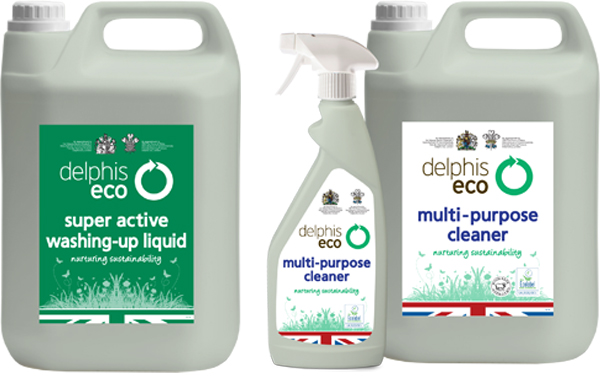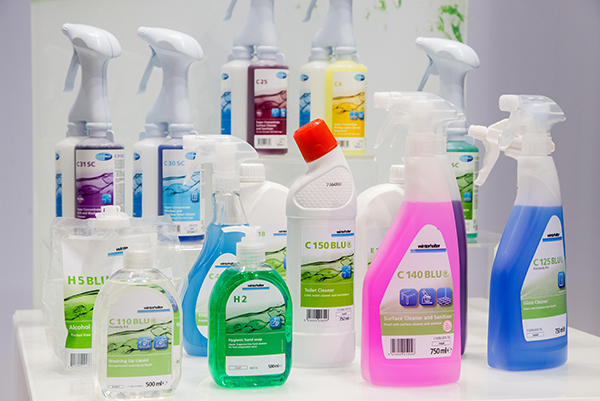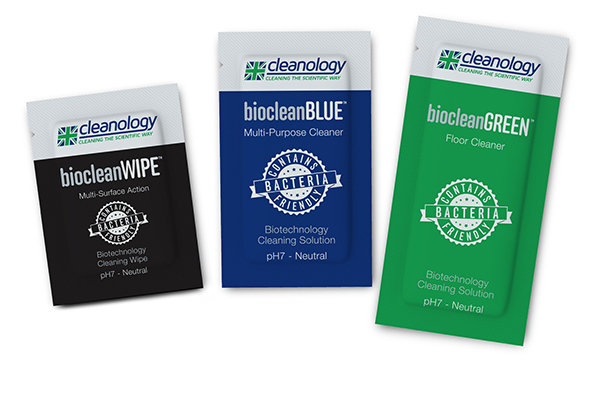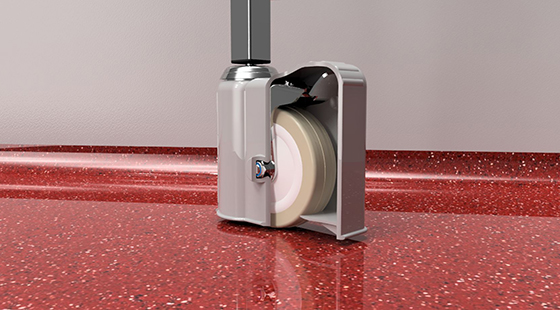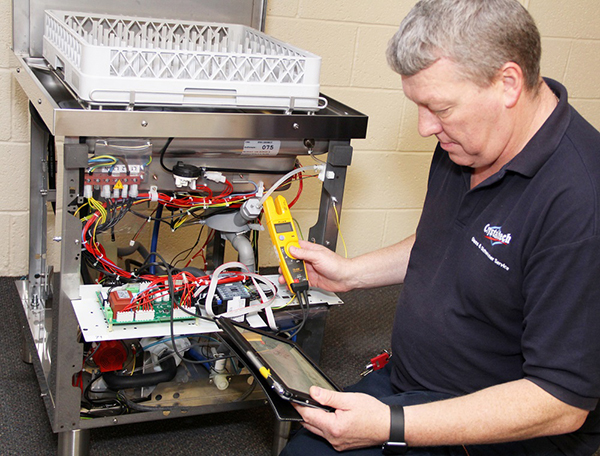Clean up your act: the latest detergents to hit the market
Whether cleaning restaurants or rooms, operators want their products to work fast, first time and with fewer harmful chemicals. Angela Frewin looks at the latest detergents to hit the market
Cleanliness may be next to godliness but it tops the essentials list for hospitality guests. A Miele Professional survey found that 88% of hotel customers valued bedroom and bedding cleanliness above value for money, a warm welcome, star rating, quality services or an attractive view. Similarly, research by Diversey reports that more than half the people entering a dirty restaurant would either leave immediately or not finish their meal.
"It's not just customers who avoid the one-star establishments, it also sends a message about how safe and secure the ways of working are to potential employees," adds Kevin Coghlan, national sales manager at cleaning specialist Bright Hygiene.
Failure to meet strict hygiene standards and health and safety regulations can incur prosecution or even shut down a site, so many operators opt for external cleaning consultants to conduct hygiene audits and establish effective, efficient cleaning regimes, says Paul Casson, technical field manager at Rentokil Specialist Hygiene.
"Housekeepers are busy and will not have time for complex processes. They want simple but effective products that help them get the job done right first time, with no need to worry about poor results or wasteful repeat cleaning," says Lisa Wilks, consumer brands marketing lead at Diversey. Its extensive Pro Formula range of professional solutions under Unilever's Domestos, Persil, Cif, Comfort and Sun brands includes the multipurpose eco-labelled (see panel) Sun Professional All in 1 Eco, a tablet combining dishwasher detergent, salt and rinse aid that washes well at lower temperatures.
Diversey's research discovered that smaller, independent hospitality businesses rely on an average of 11 products, centred around kitchen cleaner/degreaser, dishwash detergent, kitchen disinfectant, general multipurpose cleaner, glass/mirror cleaner and washroom cleaner.
"Sustainability and ecologically sound cleaning products look set to become increasingly important across many sectors," says Mark Jankovich, chief executive of Delphis Eco - good news for cleaning staff who face greater risks than skin irritation from harsh chemicals according to the University of Bergen's 20-year study of 6,000-plus people. It found that regular exposure to toxic cleaning sprays and chemicals was comparable to smoking a pack of cigarettes a day and raised the risk of asthma by 43%.
A greener clean
Technical advances mean green solutions can match or surpass the sparkle and sanitary standards of harsher counterparts, while cutting costs and packaging too.
"Eco-friendly products have to produce the same results as standard products to ensure they receive the eco-label standard," explains Mike McHardy, divisional manager at Holchem, whose eco-labelled, plant-based Holistic Green range of washroom, floor and kitchen cleaning products for hospitality proved to be 98% more effective than competitors in tests.
Concentrates can reduce waste and packaging, such as in Winterhalter's 'green' range of BLUe specialist products for hospitality, where a two-litre bottle of concentrate yields 100 750ml refillable flasks. London- and Manchester-based cleaning company Cleanology won the Environmental Awareness category in this year's Kimberly-Clark Professional Golden Service Awards for switching to pre-portioned, pocket-sized sachets of its enzyme-based multi-purpose and floor cleaners, which slashed its annual use of cleaning solution by 99.4%, from 16,200 to 108 litres.
e is a key challenge for hotel cleaners who have, on average, 20-22 minutes to clean a bedroom and bathroom, says Holchem's McHardy: "Traditionally there are four key products - toilet bowl cleaner, bathroom/washroom cleaner, glass and general purpose cleaner and an odour-control product."
Despite the importance of bedding cleanliness to hotel guests, Miele Professional's survey of hotel workers found that stained bed linen was the most common complaint and a bed change was the most common response. With only 37% and 54% of workers 'highly satisfied' with the quality of service and cleanness (respectively) from outsourced laundry, sales and marketing director Sam Bailey proposes an on-site laundry to address these issues.
High-traffic areas such as receptions and stairs present an ongoing cleaning headache. As well as daily vacuuming, carpets require interim encapsulation cleaning (where a powder is brushed into carpets to create a crystalline residue that can be vacuumed) and periodic deep-extraction cleaning (where carpets are cleaned with hot water and detergent). These functions have been combined in Diversey's Taski procarpet machines, which can perform both tasks. For hard floors, its Taski Swingo 150 scrubber-dryers scrub 10 times harder, use half the water and chemicals and remove 99% (against 60%) of solution from the floor compared with mops.
Better bathrooms
Washrooms are also high-traffic areas used continuously by customers and staff, and research by Initial Washroom Hygiene found that two-thirds of Britons were less likely to spend money with companies with malodorous washrooms. Regular cleaning and staff use of alcohol-free hand sanitisers will help prevent viruses spreading, advises Rentokil Initial technical manager Dr Colm Moore.
Cleanology chief executive Dominic Ponniah favours old-fashioned paper towels over electric hand-dryers, which he says can blow contaminated droplets from hands everywhere.
vy-duty hygiene is de rigeur in dining rooms and kitchens to achieve a positive 'score on the doors'. While areas that customers notice the most, such as tablecloths, crockery and cutlery and floors need constant attention, food safety is key, says Wilks. This means good hand hygiene and sanitising tabletops, food-prep counters and frequent-touch areas, such as door handles and light switches.
Regular deep-cleans of kitchens are paramount for both hygiene and the maintenance of cooking equipment, canopies and extraction systems, says Coghlan at Bright Hygiene - in fact, the cleaning frequency of ventilation systems are an insurance requirement. Air supply ducts must be kept clear of mildew, dust, mould, combustible grease and pathogenic organisms that can contaminate food-prep areas, reduce air flow and harbour pests. Alongside filter changes and vent wipe-downs, Casson recommends hiring expert hygiene and ventilation cleaning specialists, plus yearly inspections to comply with fire regulations.
"It's not all about getting the right cleaning products - catering equipment can be time-consuming to clean, so an appliance's 'cleanability' should be part of the buying criteria," says Keith Warren, director of the Catering Equipment Suppliers Association (CESA).
Features built into Lincat's Opus 800 cooking equipment include castors and laser-etched markings to eliminate dirt traps, says marketing manager Helen Applewhite. The line includes ovens with removable bases for easy cleaning, fryers with on-board filtration and hinged lift-out elements, and chargrill and branding plates that self-clean at 800°C. The Opus SelfCooking Centers even inform staff when - and how deeply - they need cleaning.
With food waste becoming 'the most high-profile cleaning problem in commercial kitchens', Warren suggests investing in waste systems. These can be greener than kerbside collection and generate profitable byproducts, such as biofuel. CESA is producing a guide to macerators, dewaterers, vacuum- and pumped-waste systems and composters.
What is an eco-label?
Eco-labelling is a voluntary method of certification practised around the world. An eco-label identifies products or services proven environmentally within a specific product or service category. In contrast to 'green' symbols, or claim statements by manufacturers, the most credible labels are awarded by an impartial third party.
Cover story
It's become good practice to fit castors to kitchen appliances and storage units to facilitate deep cleaning of the whole area - but they too get dirty and are difficult to clean. Nick Davis of Silicone Hygiene has invented a simple solution- removable, washable covers that fit over all styles of castor, with a self-sealing mechanism that doesn't affect manoeuvrability or braking.
While it can take 12-15 minutes to steam-clean a four-wheel unit, Davis says operators can wash 12 covers from four units in just five minutes in a dishwasher or autoclave. They are made from a single piece of clear or colour-coded injection-moulded liquid silicone rubber (which has a greater temperature tolerance) or recycled and recyclable thermoplastic elastomer.
Davis - who holds UK and worldwide PCT patents - is seeking a global manufacturer for the covers, which are forecast to sell 94 billion units worldwide. They plan to hit the market by next June.
Washer watch
Dishwasher rewash rates average 10% in hospitality and foodservice kitchens, wasting time and increasing the risk of breakages, which Diversey says account for 2%-3% of dishwashing costs.
Its cloud-based IntelliDish system works to optimise the performance and productivity of connected dishwashers, providing remote monitoring of wash cycles, use of water, energy and chemicals, costs and hygiene compliance, along with data that can be fed into food safety and hygiene compliance reporting.
"Glass and dishwashers are notorious for spreading germs if they are not maintained and cleaned properly," warns Derek Maher managing director at Crystaltech. Its service engineers use an on-site swab test that measures the adenosine tri-phosphate from micro-organisms to check machine hygiene.
er advises that kitchen staff rinse debris from dishes before loading, keep chemicals topped up and clean filters and the inside cabinet daily. He recommends chlorine-based wash chemicals.
Maher also backs the use of purifying reverse osmosis systems plus water softeners to tackle limescale: "I think that for every millimetre of scale, the appliance uses about 17% more power, so you will have a knock-on effect of that element burning out."
Suppliers
Bright Hygiene www.brighthygiene.co.uk
CESA www.cesa.org.uk
Cleanology www.cleanology.com
CrystalTech www.crystaltech.co.uk/wordpress
Delphis Eco www.delphiseco.com
Diversey www.diversey.com
Holchem www.holchem.co.uk
Initial Washroom Hygiene www.initial.co.uk/ washroom-services
Lincat www.lincat.co.uk
Miele Professional www.miele.co.uk/professional
Rentokil Specialist Hygiene www.rentokil-hygiene.co.uk
Silicon Hygiene www.facebook.com/Silicone.Hygiene
Winterhalter www.winterhalter.co.uk
Continue reading
You need to be a premium member to view this. Subscribe from just 99p per week.
Already subscribed? Log In



